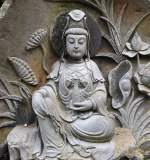| Download and install the indispensable font(s) to view Sanskrit in its full glory Read Transliterating (2) (English) to fully understand the transliteration system |
Abhinavagupta's Paramārthasāra (Paramarthasara): Stanzas 16 to 19 - Non-dual Shaivism of Kashmir
Normal translation
|
Introduction
Paramārthasāra continues with four more stanzas. This is the fifth set of stanzas, which is composed of 4 out of the 105 stanzas constituting the entire work.
Of course, I will also insert the original stanzas on which Yogarāja is commenting. I will write a lot of notes to make this book so understandable to the average reader as possible.
Yogarāja's Sanskrit will be in dark green color while the original Abhinavagupta's stanzas will be shown in dark red color. In turn, within the transliteration, the original stanzas will be in brown color, while the Yogarāja's comments will be shown in black. Also, within the translation, the original stanzas by Abhinavagupta, i.e. Paramārthasāra, will be in green and black colors, while the commentary by Yogarāja will contain words in both black and red colors.
Read Paramārthasāra and experience Supreme Ānanda or Divine Bliss, dear Śiva.
Important: All that is in brackets and italicized within the translation has been added by me in order to complete the sense of a particular phrase or sentence. In turn, all that is between double hyphen (--...--) constitutes clarifying further information also added by me.
Stanzas 16
वक्ष्यमाणे च प्राधानिके सुखादिरूपे भिन्ने भोग्ये यद्भोक्तृरूपं पुंस्तत्त्वं तत्स्वरूपमाह
मायापरिग्रहवशाद्बोधो मलिनः पुमान् पशुर्भवति।
कालकलानियतिवशाद्रागाविद्यावशेन सम्बद्धः॥१६॥
मायास्वीकारपारतन्त्र्यात्सर्वज्ञत्वसर्वकर्तृत्वमयोऽपि बोधः सर्वज्ञत्वादिगुणापहस्तनेनाख्यातिरूपमाणवं मलमापन्नो येन घटाकाशवत्पूर्णस्वरूपाच्चिदाकाशादवच्छेद्य परिमितीकृतः सन् तदेव पुंस्तत्त्वमुच्यते। अतो मायायाः पाल्यः पाश्यश्च — इति पशुराणवमायीयकार्ममलस्वभावानां पाशानां भाजनम्। अन्यच्च कालकला इति वक्ष्यमाणस्वरूपैः कालादिभिरोतप्रोततया सम्यग्बद्धो दृब्धः — इत्येवं तत्त्वषट्कवेष्टितं पुंस्तत्त्वम्॥१६॥
Vakṣyamāṇe ca prādhānike sukhādirūpe bhinne bhogye yadbhoktṛrūpaṁ puṁstattvaṁ tatsvarūpamāha
Māyāparigrahavaśādbodho malinaḥ pumān paśurbhavati|
Kālakalāniyativaśādrāgāvidyāvaśena sambaddhaḥ||16||
Māyāsvīkārapāratantryātsarvajñatvasarvakartṛtvamayo'pi bodhaḥ sarvajñatvādiguṇāpahastanenākhyātirūpamāṇavaṁ malamāpanno yena ghaṭākāśavatpūrṇasvarūpāccidākāśādavacchedya parimitīkṛtaḥ san tadeva puṁstattvamucyate| Ato māyāyāḥ pālyaḥ pāśyaśca — Iti paśurāṇavamāyīyakārmamalasvabhāvānāṁ pāśānāṁ bhājanam| Anyacca kālakalā iti vakṣyamāṇasvarūpaiḥ kālādibhirotaprotatayā samyagbaddho dṛbdhaḥ — Ityevaṁ tattvaṣaṭkaveṣṭitaṁ puṁstattvam||16||
And (ca)(, by the following stanza, Abhinavagupta) talked (āha) about the nature (sva-rūpam) of the tattva or category (tattvam) (known as) Puruṣa --12th tattva-- (puṁs-tattvam tad), which (yad) is (rūpam) an enjoyer (bhoktṛ) with respect to (the category called) Prakṛti --13th tattva-- (prādhānike) that will be spoken about later (vakṣyamāṇe). (Prakṛti is then) an object to be enjoyed (by Puruṣa) (bhogye) (and) whose form (rūpe) is pleasure (sukha), etc. (ādi) (experienced) in duality (bhinne):
Due to (vaśāt) the control and dominion (parigraha) of Māyā (māyā), Bodha or Pure Consciousness --Lord Śiva-- (bodhaḥ) becomes (bhavati) Puruṣa --category 12-- (pumān), i.e. a limited individual --lit. an animal-- (paśuḥ) furnished with Mala or Impurity (malinaḥ), (and as a result) gets completely bound (sambaddhaḥ) by means of (vaśāt... vaśena) (the five Kañcuka-s or Sheaths known as) Kāla (kāla), Kalā (kalā), Niyati (niyati), Rāga (rāga) (and) Avidyā --usually called Vidyā-- (avidyā)||16||
Because of the forcible dependence (svīkāra-pāratantryāt) (brought about) by Māyā (māyā), Bodha or Pure Consciousness --Lord Śiva-- (bodhaḥ), though (api) full of (mayaḥ) omniscience (sarvajñatva) (and) omnipotence (sarvakartṛtva), acquires (āpannaḥ) Āṇavamala (āṇavam malam), whose form (rūpam) is primordial ignorance (akhyāti), by discarding (apahastanena) the attributes (guṇa) of omniscience (sarvajñatva), etc. (ādi). As a result (yena), having become separated (avacchedya) from the Space (ākāśāt) of Consciousness (cit) whose essence (svarūpāt) is Full (pūrṇa) —as (vat) space (ākāśa) in a pot (ghaṭa)—, (this Bodha) becomes limited (parimitīkṛtaḥ san). That --limited Bodha-- (tad eva) is said to be (ucyate) the tattva or category (tattvam) (called) Puruṣa (puṁs).
A paśu (or) limited being (paśuḥ) is one who is ruled --or kept-- (pālyaḥ) and (ca) bound (pāśyaḥ) by this Māyā (atas māyāyāḥ... iti). (Consequently,) he is a recipient (bhājanam) of the nooses (pāśānām) whose natures (sva-bhāvānām) are the Mala-s or Impurities (mala) (known as) Āṇava (āṇava), Māyīya (māyīya) (and) Kārma (kārma).
Moreover (anyat ca), (Abhinavagupta, upon his mentioning) "kālakalā"(,etc.) (kāla-kalā iti), (stated that such a limited being) is completely (samyak) bound (baddhaḥ) (or) tied (dṛbdhaḥ) —as if sewn lengthwise and crosswise (ota-protatayā)— by Kāla, etc. (kāla-ādibhiḥ), whose natures will be spoken about later on (vakṣyamāṇa-svarūpaiḥ). In this way (iti evam), the Puruṣa (puṁs) category (tattvam) --tattva 12-- (is) enveloped (veṣṭitam) by a group of six (ṣaṭka) categories (tattva)||16||
Without notes of explanation yet
Stanza 17
कालादीनां तत्त्वानां चैतद्वेष्टनक्रमेण स्वरूपमाह
अधुनैव किञ्चिदेवेदमेव सर्वात्मनैव जानामि।
मायासहितं कञ्चुकषट्कमणोरन्तरङ्गमिदमुक्तम्॥१७॥
इत्थं स्वतन्त्रोऽपि बोधः स्वमायया यथाणुत्वं प्राप्तस्तथैव तदीये ज्ञानक्रियाशक्ती सञ्कुचितेऽस्य पशुरूपस्य विद्याकल इत्युच्येते। यथा राज्ञा अपहृतसर्वस्वस्यानुकम्पया जीवनार्थं किञ्चिद्धनं स्तोकं दीयते तथैवाणुत्वमापन्नस्य बोधस्यापहृतसर्वज्ञत्वादेः किञ्चित्कर्तृतापरमार्थं ज्ञत्वमुपोद्बल्यते — इति ज्ञत्वस्यैव प्राधान्यात्कालादीनां जानातिना अन्वयो दर्शितः। इदं कञ्चुकषट्कमुक्तरूपया मायया युक्तमणोराणवमलापहस्तितसर्वज्ञत्वादेः पुंसः स्वरूपाच्छादकम् स्वर्णस्य कालिकेवान्तरङ्गं निजं कथितम्। किंरूपम् — इत्याह अधुनेत्यादि। अधुनैव जानामीति सोऽणुर्वर्तमानतया इदं प्राग् मया ज्ञातं जानामि ज्ञास्यामि — इत्येवमपि कृतं करोमि करिष्ये वा — इति ज्ञानक्रियास्वरूपेण भावानपि तथा कलयन् अवच्छिनत्ति च — इत्येषोऽस्य कालः। तथा किञ्चिदेवेत्यवच्छिन्नमेव करोति सर्वं कर्तुं नालम् घटमात्रकरणाय प्रभवति न पटादौ — इत्येतदस्याणोः कलातत्त्वम्। इदमेवेति नियतात्कारणान्नियतं कार्यं यदर्थयते यथा वह्नेरेव धूमोऽअश्वमेधादिकर्मण एव स्वर्गादिफलम् न सर्वस्मात् — इत्येवं नियमेन स्वसङ्कल्पकृतकर्मप्रबन्धसमुत्थपुण्यापुण्यैरात्मा नियम्यते येन तदस्य नियतितत्त्वम्। तथा सर्वात्मनेति येयमपूर्णम्मन्यता सर्वं ममेदमुपयुज्यते भूयासं मा कदाचिन्न भूवम् — इत्येतत्पशो रागतत्त्वम्। बुद्धिधर्मो यो रागः स एकत्र कुत्रापि कान्तालक्षणेऽर्थेऽन्यदपोह्य अत्र मे राग इत्यभिष्वङ्गमात्रं न सर्वाकाङ्क्षामयस्य रागतत्त्वस्य समानः। तथा जानामीति किञ्चिदेव पुरोवर्ति घटादिकं न पुनर् दूरव्यवहितं वस्तु — इति विद्यातत्त्वम्। शुद्धविद्यापेक्षया कारिकायामविद्येति कथितं न पुनर्वेदनाभावात्। मायासहितं भेदप्रथायुक्तमेतत् कञ्चुकषट्कं पशोः — इति॥१७॥
Kālādīnāṁ tattvānāṁ caitadveṣṭanakrameṇa svarūpamāha
Adhunaiva kiñcidevedameva sarvātmanaiva jānāmi|
Māyāsahitaṁ kañcukaṣaṭkamaṇorantaraṅgamidamuktam||17||
Itthaṁ svatantro'pi bodhaḥ svamāyayā yathāṇutvaṁ prāptastathaiva tadīye jñānakriyāśaktī sañkucite'sya paśurūpasya vidyākala ityucyete| Yathā rājñā apahṛtasarvasvasyānukampayā jīvanārthaṁ kiñciddhanaṁ stokaṁ dīyate tathaivāṇutvamāpannasya bodhasyāpahṛtasarvajñatvādeḥ kiñcitkartṛtāparamārthaṁ jñatvamupodbalyate — Iti jñatvasyaiva prādhānyātkālādīnāṁ jānātinā anvayo darśitaḥ| Idaṁ kañcukaṣaṭkamuktarūpayā māyayā yuktamaṇorāṇavamalāpahastitasarvajñatvādeḥ puṁsaḥ svarūpācchādakam svarṇasya kālikevāntaraṅgaṁ nijaṁ kathitam| Kiṁrūpam — Ityāha adhunetyādi| Adhunaiva jānāmīti so'ṇurvartamānatayā idaṁ prāg mayā jñātaṁ jānāmi jñāsyāmi — Ityevamapi kṛtaṁ karomi kariṣye vā — Iti jñānakriyāsvarūpeṇa bhāvānapi tathā kalayan avacchinatti ca — Ityeṣo'sya kālaḥ| Tathā kiñcidevetyavacchinnameva karoti sarvaṁ kartuṁ nālam ghaṭamātrakaraṇāya prabhavati na paṭādau — Ityetadasyāṇoḥ kalātattvam| Idameveti niyatātkāraṇānniyataṁ kāryaṁ yadarthayate yathā vahnereva dhūmo'aśvamedhādikarmaṇa eva svargādiphalam na sarvasmāt — Ityevaṁ niyamena svasaṅkalpakṛtakarmaprabandhasamutthapuṇyāpuṇyairātmā niyamyate yena tadasya niyatitattvam| Tathā sarvātmaneti yeyamapūrṇammanyatā sarvaṁ mamedamupayujyate bhūyāsaṁ mā kadācinna bhūvam — Ityetatpaśo rāgatattvam| Buddhidharmo yo rāgaḥ sa ekatra kutrāpi kāntālakṣaṇe'rthe'nyadapohya atra me rāga ityabhiṣvaṅgamātraṁ na sarvākāṅkṣāmayasya rāgatattvasya samānaḥ| Tathā jānāmīti kiñcideva purovarti ghaṭādikaṁ na punar dūravyavahitaṁ vastu — Iti vidyātattvam| Śuddhavidyāpekṣayā kārikāyāmavidyeti kathitaṁ na punarvedanābhāvāt| Māyāsahitaṁ bhedaprathāyuktametat kañcukaṣaṭkaṁ paśoḥ — Iti||17||
(Abhinavagupta) said (āha) (that) the essential nature (sva-rūpam) of the tattva-s or categories (tattvānām) (called) Kāla, etc. (kāla-ādīnām) has to do with a gradual act of enveloping or wrapping up (veṣṭana-krameṇa) this (Puruṣa or individual soul) (etad) indeed (ca):
This (idam) is said to be (uktam) the internal (antar-aṅgam) group of six (ṣaṭkam) Sheaths (kañcuka) of an aṇu or limited being --Puruṣa-- (aṇoḥ): (The five notions) "now (adhunā eva)!", "only (eva) something (kiñcid)", "only (eva) this (idam)", "completely!" (sarva-ātmanā eva), "I know" (jānāmi), together with (sahitam) Māyā (māyā)||17||
In this way (ittham), just as (yathā) Bodha or Pure Consciousness --Lord Śiva-- (bodhaḥ), though (api) Free (svatantraḥ), acquires (prāptaḥ) the state of a limited being --the "atom" called Puruṣa-- (aṇutvam) by His own Māyā (sva-māyayā), even so (tathā eva) when His (tadīye) Powers of Knowledge and Action (jñāna-kriyā-śaktī) get contracted (sañkucite), they --those two Powers-- are said to be (ucyete) "Vidyā and Kalā" --tattva-s or categories 8 and 7, the first two Kañcuka-s or Sheaths having to do with limited knowledge and limited agency-- (vidyā-kale iti) of this (asya) limited individual (paśu-rūpasya).
Just as (yathā) someone who has been stripped of all his possessions (apahṛta-sarvasvasya) by a king (rājñā) is (then) given (dīyate) something (kiñcid) out of compassion (anukampayā), (in other words, he is given) a little (stokam) money (dhanam) for (artham) (his) livelihood (jīvana), even so (tathā eva) when Bodha or Pure Consciousness --Lord Śiva-- (bodhasya) has entered (āpannasya) into the state of a limited being (aṇutvam) who has been robbed of (his) Omniscience, etc. (apahṛta-sarvajñatva-ādeḥ), It --Bodha-- is given (upodbalyate) a limited (kiñcid) state of agent or doer (kartṛtā) (and) a knowledge (jñatva) that is of little importance --not related to the Highest Reality or Supreme Goal-- (aparama-artham) --i.e. limited knowledge, knowledge that is minor--. Thus (iti), the close connection (anvayaḥ) of Kāla, etc. (kāla-ādīnām) with the (limited) knower (jānātinā) is shown (darśitaḥ) due to the importance (prādhānyāt) of (conditioned) knowledge (jñatvasya eva) (in the case of an aṇu or atom of consciousness, viz. a limited being).
This (idam) group of six (ṣaṭkam) Kañcuka-s or Sheaths (kañcuka-s) endowed (yuktam) with Māyā (māyayā), whose form or essence (rūpayā) was (already) mentioned (ukta), conceals (ācchādakam) the essential nature (sva-rūpa) of Puruṣa --tattva or category 12-- (puṁsaḥ), i.e. of the aṇu or limited being (aṇoḥ) who has discarded (his) Omniscience, etc. (apahastita-sarvajñatva-ādeḥ) because of the Āṇavamala or primordial Impurity (āṇava-mala). It --the group of six Kañcuka-s-- is said to be (kathitam) internal (antaraṅgam) (or) innate (nijam), like (iva) a fault or flaw --a dark spot-- (kālikā) in gold (svarṇasya).
"What is its nature (kiṁrūpam iti)?" (Abhinavagupta) said (āha) "now", etc. (adhunā iti-ādi).
When the limited being (saḥ aṇuḥ) (expresses) "I know (jānāmi) now (adhunā eva... iti)!" in present tense (vartamānatayā), (then he is tacitly expressing) "I knew (mayā jñātam) this (idam) previously (prāk... iti)", "I know (jānāmi) this (idam... iti) (now)" (and) "I will know (jñāsyāmi) this (idam... iti) (in the future)". In the same way (evam api), "I did" --lit. done-- (kṛtam... iti), "I do (karomi... iti)" or (vā) "I will do (kariṣye... iti)". (As such a limited being or aṇu) "counts (kalayan) and splits/divides (avacchinatti) so (tathā) the states (bhāvān) through (his contracted) powers of knowledge and action (jñāna-kriyā-sva-rūpeṇa)", this (eṣaḥ) (is) his (asya) Kāla --tattva or category 10 that is related to "the notion of time"-- (kālaḥ).
Likewise (tathā), (when the limited being expresses) "only (eva) something (kiñcid... iti)", he produces (karoti) something that is separate (avacchinnam eva) (from the All, but) he is not able (na alam) to produce (kartum) everything (sarvam). (For example,) "he is able (prabhavati) to make (karaṇāya) only (mātra) a pot (ghaṭa) (but) not (na) a cloth, etc. (paṭa-ādau... iti)". This (etad) (is) the Kalā (kalā) category (tattvam) of the aṇu or limited being (asya aṇoḥ) --the tattva or category 7 related to "limited agency"--.
(By the expression) "only (eva) this (idam... iti)" (Abhinavagupta indicated that a limited being) strives to obtain (arthayate) an effect (kāryam) that (yad) is restricted (niyatam) from an (equally) restricted cause (niyatāt kāraṇāt), like (yathā) smoke (dhūmaḥ) from fire (vahneḥ) only (eva), the fruit (phalam) (related to going to) heaven (svarga), etc. (ādi) from the performance (karmaṇaḥ) of the horse sacrifice (aśva-medha), etc. (ādi) only (eva), (but) not (na) from all (causes) (sarvasmāt). Thus (iti evam), as a result (yena), the ātmā or (limited) being (ātmā), is invariably (niyamena) restricted (niyamyate) by merit and demerit (puṇya-apuṇyaiḥ) that arise (samuttha) from a continuous series (prabandha) of actions (karma) done (kṛta) (by such a limited being) of his own (sva) volition (saṅkalpa). That (tad) (is) his (asya) Niyati (niyati) category (tattvam) --the tattva or category 11 related to "limited causation"--.
Similarly (tathā), (by the expression) "completely" (sarva-ātmanā iti) (Abhinavagupta pointed out) this (iyam) which (yā) (is) the state of thinking oneself to be (manyatā) incomplete (apūrṇam) (through notions such as:) "All (sarvam) this (idam) is to be employed or used (upayujyate) by me (mama... iti)", "May I become (bhūyāsam... iti)!", "Let me never become (mā kadācid na bhūvam)!". This (etad) (is) the Rāga (rāga) category (tattvam) --the tattva or category 9 related to "incompleteness"-- of a limited being (paśoḥ).
(Anyway, the term) Rāga (rāgaḥ)(, when used as meaning "attachment or vehement desire",) is that (saḥ) which (yaḥ) is of the nature (dharmaḥ) of Buddhi --intellect, the category 14-- (buddhi). (For example:) In one place whatsoever (ekatra kutra-api), after having pushed another (person) away --i.e. another suitor-- (anyat apohya) with reference to an object (arthe) appearing as (lakṣaṇe) a beloved woman (kāntā), "My (me) vehement desire (rāgaḥ) for her (atra... iti)" (is) only (mātram) intense attachment (abhiṣvaṅga), (but) it is not the same as (samānaḥ) the Rāga category (rāga-tattvasya) (because the Rāga category) --the tattva 9-- consists of (mayasya) a desire (ākāṅkṣā) for all (sarva).
In the same way (tathā), (by the expression) "I know" (jānāmi iti) (Abhinavagupta indicated that a limited being knows) only (eva) something (kiñcid) that is before his eyes (purovarti), (such as) a pot (ghaṭa), etc. (ādikam), but (punar) not (na) a reality (vastu) that is far (dūra) (or) concealed (vyavahitam). This (is) the Vidyā (vidyā) category (tattvam) --the tattva or category 8 related to "limited knowledge".
(Such a category) is mentioned (kathitam) as "avidyā" (avidyā iti) in the aphorism (kārikāyām) with reference to (apekṣayā) (the category 5 known as) Śuddhavidyā (śuddha-vidyā)(, which was called "Vidyā" by Abhinavagupta in the aphorism 14), and not (na punar) because there is absence (abhāvāt) of knowledge (in it) (vedana).
"This group of six (ṣaṭkam) Sheaths (kañcuka) —including Māyā (māyā-sahitam)— of a limited being (paśoḥ) is engaged in (yuktam) spreading (prathā) duality --differences-- (bheda... iti)"||17||
Without notes of explanation yet
Stanza 18
कथमेतस्य कञ्चुकषट्कस्याणुं प्रति अन्तरङ्गत्वम् — इत्याह
कम्बुकमिव तण्डुलकणविनिविष्टं भिन्नमप्यभिदा।
भजते तत्तु विशुद्धिं शिवमार्गौन्मुख्ययोगेन॥१८॥
वास्तवेन वृत्तेन भिन्नमपि कम्बुकं यथा अभिदा तण्डुलकणविनिविष्टमित्यभेदेन तण्डुलान्तश्चोतं भासते निपुणैरपि यत्नतः प्रक्षिप्यमाणं तण्डुलस्यान्तरङ्गत्वान्न पृथगवतिष्ठते तथैतन्मायादिकञ्चुकमणोस्तण्डुलस्थानीयस्यान्तरङ्गत्वात्कम्बुकस्थानीयं व्यतिरिक्तमप्यव्यतिरिक्ततया पूर्णसंवित्स्वरूपमाच्छाद्य स्थितम् — इति शेषः। एवमपि दुर्निवारं कथं तद् विलीयते — इत्याह भजत इत्यादि। तुर्विशेषे नान्योऽत्रोपायः। शिवस्य स्वात्ममहेश्वरस्य योऽसौ मार्गः परमाद्वयचिदानन्दैकघनोऽस्मि ममैवेदं विश्वं स्वशक्तिविजृम्भणमात्रमिति या स्वात्मस्वरूपविभूतिप्रत्यवमर्शरूपा सरणिस्तदौन्मुख्यं दार्ढ्येन तन्निभालनपरत्वं स एव योगः पूर्णरूपतयाणोः स्वात्मनि स्वस्वरूपत्वेन सम्बन्धस्तेन तदुक्तस्वरूपं कञ्चुकं विशेषेण शुद्धिं भजते स्वयमेव निःशेषेण विलयं सेवते। एतदुक्तं स्यात् — यदा परमेश्वरशक्तिपातविशुद्धहृदयः पशुर्भवति तदा अहमेव महेश्वर इति स्वात्मज्ञानाविर्भावात्स्वयमेव पशुत्वापादकं कञ्चुकावरणं विलीयते न पुनरत्र स्वात्मज्ञानं विहाय मायीयं किञ्चिन्नियतिशक्तिसमुत्थं कर्म प्रगल्भते — इति॥१८॥
Kathametasya kañcukaṣaṭkasyāṇuṁ prati antaraṅgatvam — Ityāha
Kambukamiva taṇḍulakaṇaviniviṣṭaṁ bhinnamapyabhidā|
Bhajate tattu viśuddhiṁ śivamārgaunmukhyayogena||18||
Vāstavena vṛttena bhinnamapi kambukaṁ yathā abhidā taṇḍulakaṇaviniviṣṭamityabhedena taṇḍulāntaścotaṁ bhāsate nipuṇairapi yatnataḥ prakṣipyamāṇaṁ taṇḍulasyāntaraṅgatvānna pṛthagavatiṣṭhate tathaitanmāyādikañcukamaṇostaṇḍulasthānīyasyāntaraṅgatvātkambukasthānīyaṁ vyatiriktamapyavyatiriktatayā pūrṇasaṁvitsvarūpamācchādya sthitam — Iti śeṣaḥ| Evamapi durnivāraṁ kathaṁ tad vilīyate — Ityāha bhajata ityādi| Turviśeṣe nānyo'tropāyaḥ| Śivasya svātmamaheśvarasya yo'sau mārgaḥ paramādvayacidānandaikaghano'smi mamaivedaṁ viśvaṁ svaśaktivijṛmbhaṇamātramiti yā svātmasvarūpavibhūtipratyavamarśarūpā saraṇistadaunmukhyaṁ dārḍhyena tannibhālanaparatvaṁ sa eva yogaḥ pūrṇarūpatayāṇoḥ svātmani svasvarūpatvena sambandhastena taduktasvarūpaṁ kañcukaṁ viśeṣeṇa śuddhiṁ bhajate svayameva niḥśeṣeṇa vilayaṁ sevate| Etaduktaṁ syāt — Yadā parameśvaraśaktipātaviśuddhahṛdayaḥ paśurbhavati tadā ahameva maheśvara iti svātmajñānāvirbhāvātsvayameva paśutvāpādakaṁ kañcukāvaraṇaṁ vilīyate na punaratra svātmajñānaṁ vihāya māyīyaṁ kiñcinniyatiśaktisamutthaṁ karma pragalbhate — Iti||18||
How (katham), as far as a limited being is concerned (aṇum prati), is this (etasya) group of six (ṣaṭkasya) Sheaths (kañcuka) "internal" (antaraṅgatvam... iti)? (Abhinavagupta) said (the following to answer that question) (āha):
(That group of six Sheaths is) as (iva) the bran (kambukam) residing (viniviṣṭam) on a rice-grain (taṇḍula-kaṇa), that though (api) separate (from the grain itself) (bhinnam), it seems to be not separated (from it) --lit. with absence of separation-- (abhidā). But (tu) it --the group of six Sheaths-- (tád) attains (bhajate) extreme purity (viśuddhim) through the Yoga or Union (yogena) oriented (aunmukhya) toward the Śiva's path (śiva-mārga)||18||
Just as (yathā), although (api) the bran (kambukam) really (vāstavena) exists (vṛttena) separately (from the rice-grain) (bhinnam), it resides (viniviṣṭam) on a rice-grain (taṇḍula-kaṇa) (as if) not separated (from it) --lit. with absence of separation-- (abhidā), i.e. it appears (bhāsate) (as if) protected (ūtam) inside (antar ca) the grain (itself) (taṇḍula), (and,) since it is internal (antaraṅgatvāt) with reference to the grain (taṇḍulasya), it remains (avatiṣṭhate) not (na) separated (pṛthak) (from the grain) --i.e. united with it-- even though (api) (such a bran) is thrown --in the sense of "crushed/pounded"-- (prakṣipyamāṇam) vigorously (yatnataḥ) by a skillful person (nipuṇaiḥ); even so (tathā) this (etad) (six-fold) Kañcuka or Sheath (kañcukam) composed of Māyā (māyā), etc. (ādi) —representing (sthānīya) the bran (kambuka)— related to a limited individual (aṇoḥ) —representing (sthānīyasya) the grain (taṇḍula)—, though (api) it is separated (from the limited individual indeed) (vyatiriktam), it remains (anyway) (sthitam), after concealing (ācchādya) the Full and Perfect (pūrṇa) essential nature (sva-rūpam) of Pure Consciousness --Lord Śiva-- (saṁvid), as not separated (from such a limited individual) --viz. as united with him-- (avyatiriktatayā). (Why?) Because (this six-fold Kañcuka or Sheath) is internal (with regard to the limited individual) (antaraṅgatvāt). This should be supplied (to the stanza in order to complete the sense) (iti śeṣaḥ).
Though (api) (this is) so (evam), "How (katham) (is) that (six-fold Kañcuka or Sheath) (tad) —which is difficult to suppress (durnivāram)— (finally) dissolved (vilīyate... iti)?". (Abhinavagupta) said (āha): "Bhajate", etc. (bhajate iti-ādi) (in the second half of the stanza).
The term "tu" (in the stanza) --lit. but-- (tuḥ) is used in the sense of "special" (viśeṣe), viz. "there is no other (na anyaḥ) means (upāyaḥ) to achieve this (atra)". This (asau) "mārga" (mārgaḥ) that (yaḥ) belongs to Śiva (śivasya) —to the Great Lord (mahā īśvarasya) who is one's own (sva) Self (ātma)— (is) the path (saraṇiḥ) having to do (rūpā) with becoming aware of --with getting in touch with-- (pratyavamarśa) the Power and Greatness (vibhūti) of the essential nature (sva-rūpa) of one's (sva) Self (ātma), which (can be summarized by the following statement) (yā): "I am (asmi) a compact mass (eka-ghanaḥ) of Consciousness (cit) (and) Bliss (ānanda) (replete with) supreme (parama) non-dualism (advaya), (and) this (idam) universe (viśvam) is only (mātram) a manifestation or display (vijṛmbhaṇa) of My (mama eva) own (sva) Power (śakti... iti)". (The expression) "tadaunmukhya" (in the stanza) (tad-aunmukhyam) (indicates) the state of being firmly devoted (dārḍhyena... paratvam) to the contemplation (nibhālana) on that (statement) --i.e. to the Śiva's path summarized by that short but significant statement-- (tad). That (saḥ eva) (is) Yoga (yogaḥ), (and) when it is fully developed (pūrṇa-rūpatayā) in the case of a limited individual or aṇu (aṇoḥ), (such a Yoga implies) a connection (sambandhaḥ) with his own essential nature (sva-sva-rūpatvena) in his own Self (sva-ātmani). By that (fully developed Yoga) (tena), the (six-fold) Kañcuka or Sheath (kañcukam), whose essence (sva-rūpam) was (already) mentioned (ukta), attains (bhajate) purity (śuddhim) exceedingly (viśeṣeṇa), i.e. it gets totally dissolved (niḥśeṣeṇa vilayam sevate) by itself (svayam eva).
This (etad) is (syāt) what has been said (uktam): When (yadā) the limited individual (paśuḥ) becomes (bhavati) one whose heart (hṛdayaḥ) is totally pure (viśuddha) due to the descent (pāta) of Power (śakti) coming from the Supreme (parama) Lord (īśvara), then (tadā), because of the manifestation (āvirbhāvāt) of the Knowledge (jñāna) about one's own (sva) Self (ātma) (in the form of) "I (aham) (am) the Great (mahā) Lord (īśvaraḥ iti) indeed (eva... iti)", the veil (āvaraṇam) (called) the (six-fold) Kañcuka or Sheath (kañcuka), which produces (āpādakam) the state of paśu --limited individual or animal-- (paśutva), is dissolved (vilīyate) by itself (svayam eva). However (punar), when he abandons --lit. having abandoned or after abandoning-- (vihāya) the Knowledge (jñāna) of his own (sva) Self (ātma), no (na... kiñcid) mayic --i.e. related to Māyā-- (māyīyam) action (karma) arisen from (samuttham) the Niyatiśakti --the power that brings about restriction in the sense organs of the limited beings-- (niyati-śakti) is able to (pragalbhate) generate this (dissolution of the six-fold Kañcuka or Sheath) (atra)||18||
Without notes of explanation yet
Stanza 19
एवंविधस्याणोर्भोक्तुश्च भोग्येन भाव्यम् — इति प्राधानिकं तत्त्वसर्गमाह
सुखदुःखमोहमात्रं निश्चयसङ्कल्पनाभिमानाच्च।
प्रकृतिरथान्तःकरणं बुद्धिमनोऽहङ्कृति क्रमशः॥१९॥
सत्त्वरजस्तमसां यत् सुखदुःखमोहात्मकं सामान्यं रूपम् — अङ्गाङ्गिभावो यत्र नोपलभ्यते — सा मूलकारणं प्रकृतिः। प्रकृतेरनन्तरं कार्यरूपमन्तःकरणमाह निश्चय इत्यादि। निश्चय इदमेतादृक् — इति सङ्कल्पनं मननमाभिमानो ममता — इति क्रमेण बुद्धि मनोऽहङ्कार इत्येवंरूपं त्रितयमन्तःकरणमङ्गाङ्गिभावेन गुणानां कार्यं भूतेन्द्रियाद्यपेक्षया च कारणम् — इति॥१९॥
Evaṁvidhasyāṇorbhoktuśca bhogyena bhāvyam — Iti prādhānikaṁ tattvasargamāha
Sukhaduḥkhamohamātraṁ niścayasaṅkalpanābhimānācca|
Prakṛtirathāntaḥkaraṇaṁ buddhimano'haṅkṛti kramaśaḥ||19||
Sattvarajastamasāṁ yat sukhaduḥkhamohātmakaṁ sāmānyaṁ rūpam — Aṅgāṅgibhāvo yatra nopalabhyate — Sā mūlakāraṇaṁ prakṛtiḥ| Prakṛteranantaraṁ kāryarūpamantaḥkaraṇamāha niścaya ityādi| Niścaya idametādṛk — Iti saṅkalpanaṁ mananamābhimāno mamatā — Iti krameṇa buddhi mano'haṅkāra ityevaṁrūpaṁ tritayamantaḥkaraṇamaṅgāṅgibhāvena guṇānāṁ kāryaṁ bhūtendriyādyapekṣayā ca kāraṇam — Iti||19||
And (ca) (in the following stanza, Abhinavagupta) spoke (āha) about the emission (sargam) of tattva-s or categories (tattvam) coming from Pradhāna or Prakṛti (prādhānikam), "(which) --i.e. Pradhāna or Prakṛti along with her emission of tattva-s-- must be understood (bhāvyam) as the object of enjoyment (bhogyena) of such (evaṁvidhasya) a limited being (aṇoḥ) —the enjoyer (bhoktuḥ... iti)—":
Prakṛti (prakṛtiḥ) consists of only (mātram) pleasure (sukha), pain (duḥkha) (and) delusion (moha). And (ca) then (atha), (from this Prakṛti herself,) the inner (psychic) organ (antaḥkaraṇam) comprising Buddhi --intellect--, Manas --mind-- and Ahaṅkāra --ego-- (buddhi-manas-ahaṅkṛti) (emerges) from definite cognition --lit. fixed opinion--, the act of thinking --lit. volition-- and the state of "mine" --lit. an erroneous conception regarding one's own Self-- (niścaya-saṅkalpana-abhimānāt), in succession --i.e. respectively-- (kramaśaḥ)||19||
That (sā) (is) Prakṛti (prakṛtiḥ), the root cause (mūla-kāraṇam), which (yat) (is) a balanced form (sāmānyam rūpam) composed of (ātmakam) pleasure (sukha), pain (duḥkha) (and) delusion (moha), viz. (composed) of (the guṇa-s or qualities called) Sattva, Rajas and Tamas (sattva-rajas-tamasām). (In other words, Prakṛti is a tattva or category) in which (yatra) a state or condition (bhāvaḥ) of something subordinating --having subordinate parts-- (aṅgi) (and) something being subordinate (aṅga) is not (na) perceived (upalabhyate).
Immediately after (anantaram) (describing Prakṛti as consisting of only pleasure, pain and delusion, Abhinavagupta) mentioned (āha) the inner (psychic) organ (antaḥkaraṇam) as being (rūpam) the effect (kārya) of Prakṛti (prakṛteḥ) (when he said) "niścaya" --definite cognition-- (niścayaḥ), etc. (iti-ādi)".
Niścaya or definite cognition (niścayaḥ) (implies the following:) "This (idam) (is) of this kind (etādṛk... iti)", saṅkalpana (saṅkalpanam) (is) "the act of thinking" (mananam... iti) (and) abhimāna (abhimānaḥ) (is) "the state of 'mine'" (mamatā... iti). (Those three things,) in succession (krameṇa), (give rise to) "Buddhi --intellect-- (buddhi), Manas --mind-- (manas) (and) Ahaṅkāra --ego-- (ahaṅkāraḥ iti)". (On the one hand,) the inner (psychic) organ (antaḥkaraṇam) consisting of such (evaṁrūpam) triad (tritayam) (is) the effect (kāryam) of the guṇa-s or qualities of Prakṛti --Sattva, Rajas and Tamas-- (guṇānām) when they are in a state (bhāvena) of something subordinating --having subordinate parts-- (aṅgi) (and) something being subordinate (aṅga), and (ca) (on the other hand, this very inner psychic organ is) the cause (kāraṇam) with respect to (apekṣayā) Bhūta-s or gross elements --tattva-s 32 to 35-- (bhūta), Indriya-s or powers of perception and action --tattva-s 17 to 26-- (indriya), etc. (ādi)||19||
Without notes of explanation yet
Further Information
This document was conceived by Gabriel Pradīpaka, one of the two founders of this site, and spiritual guru conversant with Sanskrit language and Trika philosophy.
For further information about Sanskrit, Yoga and Indian Philosophy; or if you simply want to comment, ask a question or correct a mistake, feel free to contact us: This is our e-mail address.
| Back to Stanzas 12 to 15 | Continue to read Stanzas 20 to 23 |





























